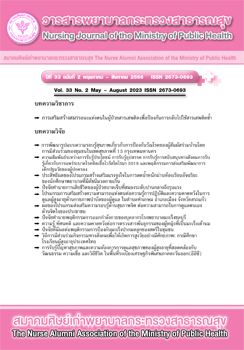Knowledge, Attitudes and Expectations toward Genetic Testing of Women with Breast Cancer
Main Article Content
Abstract
Abnormalities in the genetic code of the BRCA1 and BRCA2 genes are responsible for the development of breast cancer. DNA testing for abnormalities in both genes is a form of precision medicine in treating and preventing diseases that take into account the abnormality of the genes. This research aimed to study the knowledge, attitudes, and expectations of women with breast cancer to genetic testing. A descriptive cross-sectional design was conducted. The sample consisted of 127 patients with breast cancer. They were selected by purposive sampling with inclusion criteria. The research tools consisted of 1) a test of cancer knowledge, abnormality of genes, genetic testing with 13 items, and 2) an attitude and expectation questionnaire with nine items. The data were analyzed using descriptive statistics. The results showed that the average age of the sample was 53.30 years (SD± 12.6), primary education was 47.2%. 27.6% of the sample had a family history of breast cancer. Of the sample,38 people (31.6%) received a knowledge score of more than 50%. Of the sample, 72.4% were interested in learning about genetic testing in cancer, and 76.4% were to undergo gene testing. Of the sample, 35.4% had sufficient knowledge about the potential benefits and risks of genetic testing to decide on testing, while 70.1% needed more formal genetic counseling prior to testing. In conclusion, although breast cancer patients knew little about genetic testing, many expressed interests in being tested. An educational program could be developed to inform women about cancer genetics and testing.
Article Details

This work is licensed under a Creative Commons Attribution-NonCommercial-NoDerivatives 4.0 International License.
บทความและรายงานวิจัยในวารสารพยาบาลกระทรวงสาธารณสุข เป็นความคิดเห็นของ ผู้เขียน มิใช่ของคณะผู้จัดทำ และมิใช่ความรับผิดชอบของสมาคมศิษย์เก่าพยาบาลกระทรวงสาธารณสุข ซึ่งสามารถนำไปอ้างอิงได้
References
Giaquinto AN, Sung H, Miller KD, Kramer JL, Newman LA, Minihan A, et al. Breast cancer statistics, 2022. CA: A Cancer Journal for Clinicians 2022;72(6):524-41.
National Cancer Institute. Hospital-based cancer registry 2020. In: Health DoMSMoP, editor.: National Cancer Institute,2021.
Katsura C, Ogunmwonyi I, Kankam HK, Saha S. Breast cancer: presentation, investigation and management. British Journal of Hospital Medicine 2022;83(2):1-7.
Albert C, Haase M, Albert A, Kropf S, Bellomo R, Westphal S, et al. BRCA1/BRCA2 pathogenic variant breast cancer: treatment and prevention strategies. Annals of laboratory medicine 2020;40(2): 114-21.
Okano M, Nomizu T, Tachibana K, Nagatsuka M, Matsuzaki M, Katagata N, et al. The relationship between BRCA-associated breast cancer and age factors: an analysis of the Japanese HBOC consortium database. Journal of Human Genetics 2021;66(3):307-14.
Kuchenbaecker KB, Hopper JL, Barnes DR, Phillips K-A, Mooij TM, Roos-Blom M-J, et al. Risks of breast, ovarian, and contralateral breast cancer for BRCA1 and BRCA2 mutation carriers. Jama 2017;317(23):2402-16.
Zang F, Ding X, Chen J, Hu L, Sun J, Zhang J, et al. Prevalence of BRCA1 and BRCA2 pathogenic variants in 8627 unselected patients with breast cancer: stratification of age at diagnosis, family history and molecular subtype. Breast Cancer Research and Treatment 2022;195(3):431-9.
Terui-Kohbata H, Egawa M, Yura K, Yoshida M. Knowledge and attitude of hereditary breast cancer among Japanese university female students. Journal of Human Genetics. 2020;65(7):591-9.
McCall MK, Ibikunle S, Murphy Y, Hunter K, Rosenzweig MQ. Knowledge and attitudes about genetic testing among black and white women with breast cancer. Journal of Racial and Ethnic Health Disparities 2021;8(5):1208-16.
Metcalfe KA, Eisen A, Poll A, Candib A, McCready D, Cil T, et al. Rapid genetic testing for BRCA1 and BRCA2 mutations at the time of breast cancer diagnosis: an observational study. Annals of Surgical Oncology 2021;28(4):2219-26.
Valencia OM, Samuel SE, Viscusi RK, Riall TS, Neumayer LA, Aziz H. The role of genetic testing in patients with breast cancer: a review. JAMA surgery 2017;152(6):589-94.
Meehan J, Gray M, Martínez-Pérez C, Kay C, Pang LY, Fraser JA, et al. Precision medicine and the role of biomarkers of radiotherapy response in breast cancer. Frontiers in oncology 2020;10:628.
Pujol P, Barberis M, Beer P, Friedman E, Piulats JM, Capoluongo ED, et al. Clinical practice guidelines for BRCA1 and BRCA2 genetic testing. European Journal of Cancer 2021;146:30-47.
National Health Security Office (NHSO). Screening for breast cancer genes in high-risk patients reduce the risk of cancer in direct relatives. [internet] [cited 1 June 2023] Avialable from https://www.nhso.go.th/news/38772023.123
Guo F, Hirth JM, Fuchs EL, Cofie LE, Brown V, Kuo Y-F, et al. Knowledge, attitudes, willingness to pay, and patient preferences about genetic testing and subsequent risk management for cancer prevention. Journal of Cancer Education 2020:1-8.
Elkefi S, Choudhury A, Strachna O, Asan O. Impact of health perception and knowledge on genetic testing decisions using the health belief model. JCO Clinical Cancer Informatics 2022;6:e2100117.
Gómez-Trillos S, Sheppard VB, Graves KD, Song M, Anderson L, Ostrove N, et al. Latinas’ knowledge of and experiences with genetic cancer risk assessment: Barriers and facilitators. Journal of genetic counseling 2020;29(4):505-17.
Starkings R, Shilling V, Jenkins V, Fallowfield L. A systematic review of communication interventions to help healthcare professionals discuss genetic testing for breast cancer. Breast Cancer Research and Treatment. 2020;183:9-21.
Conley CC, Castro-Figueroa EM, Moreno L, Dutil J, Garcí a JD, Burgos C, et al. A pilot randomized trial of an educational intervention to increase genetic counseling and genetic testing among Latina breast cancer survivors. Journal of genetic counseling 2021;30(2):394-405.
Van Riel E, Warlam-Rodenhuis CC, Verhoef S, Rutgers EJ, Ausems MG. BRCA testing of breast cancer patients: medical specialists' referral patterns, knowledge and attitudes to genetic testing. Eur J Cancer Care (Engl) 2010;19(3):369-76.
Ademuyiwa FO, Salyer P, Tao Y, Luo J, Hensing WL, Afolalu A, et al. Genetic counseling and testing in African American patients with breast cancer: a nationwide survey of US breast oncologists. Journal of Clinical Oncology 2021;39(36):4020-8.

